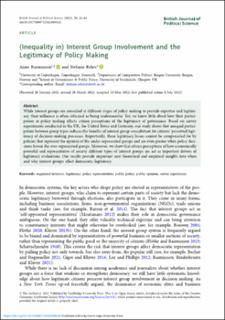| dc.contributor.author | Rasmussen, Anne | |
| dc.contributor.author | Reher, Stefanie | |
| dc.date.accessioned | 2023-04-19T08:45:47Z | |
| dc.date.available | 2023-04-19T08:45:47Z | |
| dc.date.created | 2023-03-09T15:00:09Z | |
| dc.date.issued | 2022 | |
| dc.identifier.issn | 0007-1234 | |
| dc.identifier.uri | https://hdl.handle.net/11250/3063738 | |
| dc.description.abstract | While interest groups are consulted at different stages of policy making to provide expertise and legitimacy, their influence is often criticized as being undemocratic. Yet, we know little about how their participation in policy making affects citizen perceptions of the legitimacy of governance. Based on survey experiments conducted in the UK, the United States and Germany, our study shows that unequal participation between group types reduces the benefits of interest group consultation for citizens' perceived legitimacy of decision-making processes. Importantly, these legitimacy losses cannot be compensated for by policies that represent the opinion of the under-represented groups and are even greater when policy decisions favour the over-represented groups. Moreover, we show that citizen perceptions of how economically powerful and representative of society different types of interest groups are act as important drivers of legitimacy evaluations. Our results provide important new theoretical and empirical insights into when and why interest groups affect democratic legitimacy. | en_US |
| dc.language.iso | eng | en_US |
| dc.rights | Navngivelse 4.0 Internasjonal | * |
| dc.rights.uri | http://creativecommons.org/licenses/by/4.0/deed.no | * |
| dc.title | (Inequality in) Interest Group Involvement and the Legitimacy of Policy Making | en_US |
| dc.type | Journal article | en_US |
| dc.type | Peer reviewed | en_US |
| dc.description.version | publishedVersion | en_US |
| dc.rights.holder | Copyright 2022 The Author(s) | en_US |
| cristin.ispublished | true | |
| cristin.fulltext | original | |
| cristin.qualitycode | 2 | |
| dc.identifier.doi | https://doi.org/10.1017/S0007123422000242 | |
| dc.identifier.cristin | 2132825 | |
| dc.source.journal | British Journal of Political Science | en_US |
| dc.source.pagenumber | 45-64 | en_US |
| dc.identifier.citation | British Journal of Political Science. 2022, 53 (1), 45-64. | en_US |
| dc.source.volume | 53 | en_US |
| dc.source.issue | 1 | en_US |

